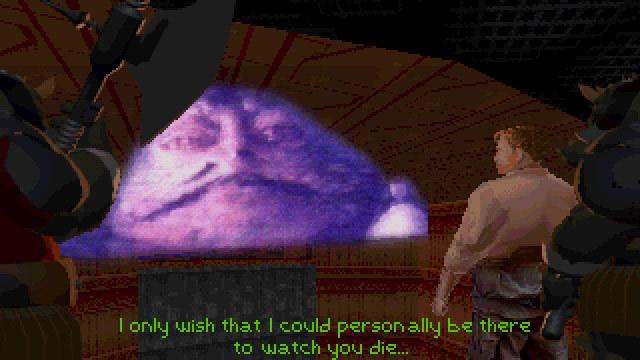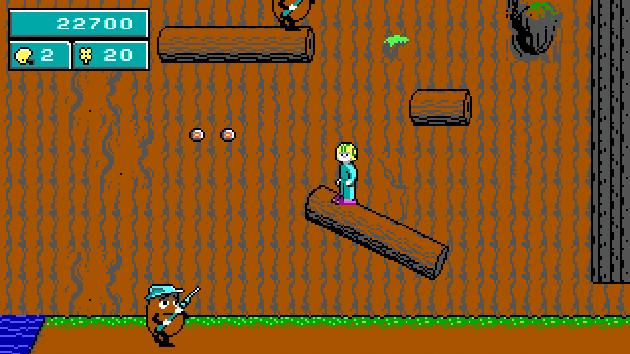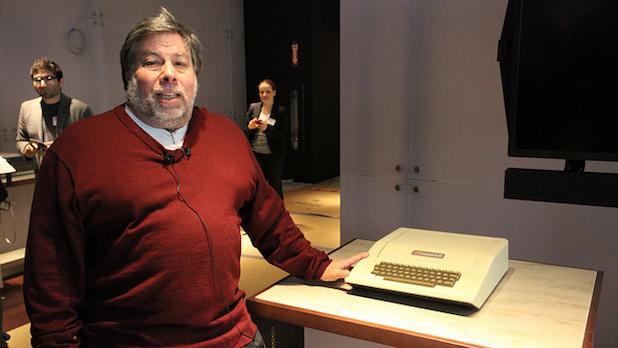DOS
Latest

A fan reverse-engineered 1995's 'Star Wars: Dark Forces' to make it easier to play on modern systems
A fan spent spent three years reverse-engineering Star Wars: Dark Forces to make it a lot easier to play on modern systems.

After Math: Stand and Delivery
Things happened this week, such as Alphabet commencing commercial flights of its Wing drone delivery program in Christiansburg, Virginia. But they weren't the only tech corporation that decided to put things where they previously were not at speeds the public is unaccustomed to.

Internet Archive adds 2,500 more DOS games to playable database
Since 2013, the underappreciated heroes at Internet Archive have been working diligently to preserve old and abandoned PC games. In 2015, the organization started hosting 2,400 DOS games, allowing you to play cult classics like Gods and Tongue of the Fatman in your browser. This week, the organization added another 2,500 DOS games to its database.

Bungie is banning Destiny's biggest cheaters
As video game makers continue to incorporate more online and multiplayer elements into their games, they need to give special consideration to how they deal with cheaters. Consoles are locked down by default, meaning players have fewer tools to manipulate their experience, but Bungie has confirmed it's (finally) ready to drop the banhammer in an attempt to stop people ruining Destiny's competitive multiplayer modes.

You can run over 1,000 Windows 3.1 programs in your browser
The Internet Archive has spent many years gathering and storing digital content from the past. It now hosts millions of web pages, texts, videos and audio snippets, but recently the site expanded its collection to include software, or more specifically, games. After making more than 2,400 DOS titles available to play in the browser, the Internet Archive has embraced the GUI and done the same for Windows 3.1.

Yesteryear's malware was gorgeous in its simplicity
The Internet Archive is apparently devoted to preserving all parts of the web's history and that even extends to malware and viruses from the MS DOS era. The good news is that you can peruse a pretty sizable collection in the Malware Museum now without worrying that they'll wreck your machine. Like the nigh-forgotten PC games it has collected over the years, the malware plays within browsers. To a point, they're even somewhat interactive. I wasn't able to get the "CHKDSK" command to work, but that may be an effort to accurately portray this nightmare from yesteryear. You know, where, no matter what you tried, you were stuck watching idly as personal data went up in a cloud of digital smoke.

Steam's Christmas privacy issues affected 34,000 users
On Christmas day, up to 34,000 Steam members were able to view other users' private information, including billing and email addresses, following a glitch triggered by a denial-of-service attack, Valve announced today. On the day of the attack, Valve said that the glitch was the result of a caching issue, and that users were able to view strangers' information, though they couldn't take action on other people's accounts. Valve's update today clarifies the caching issue, attributing it to the DoS attack.

Play classic MS-DOS games without even leaving Twitter
Although they went live at the very start of the year, it was like all of our Christmases had come at once when Archive.org added 2,400 playable MS-DOS games to its website. Retro titles like Maniac Mansion, Oregon Trail and Doom are all available, with the only downside being that you have to visit each specific game's page to play them. However, the eagle-eyed folk at Wired noticed these have recently started working on Twitter, meaning you can get all of your social networking done while simultaneously saving Sandy Pantz from the evil Dr Fred. Thanks to Twitter's Cards platform, all you have to do is tweet the URL of the game you want to play and it'll take care of the rest. You can even embed the tweet (and thus the game) inside a webpage, exactly like we've done below.

UK police arrest man connected to Lizard Squad PlayStation and Xbox attacks
Ever since its Christmas Day attack that took PlayStation and Xbox Live servers down, the "Lizard Squad" has taunted authorities while simultaneously trying to market its takedown-for-hire DDoS service. Police apparently arrested a London-based man affiliated with the group before the turn of the year (although it was over claims of PayPal hacking), but UK authorities have today claimed that they've tracked down at least one member who was involved in the attacks. Officers from the South East Regional Organised Crime Unit (SEROCU) Cyber Crime Unit say that they have arrested an 18-year-old man in connection with a "the denial of service attack of Sony Playstation and Xbox systems in 2014 and swatting offences."

You can play 2,400 classic DOS games in your web browser
If you're a PC gamer of a certain age (cough), you've probably lamented that many of the titles you played as a kid are hard to use on modern systems without downloading emulators or waiting for special re-releases. Well, it just got a lot easier to relive your gaming glory days. The Internet Archive's growing collection of web-based retro games now includes roughly 2,400 MS-DOS classics -- you can now play cult hits like Gods or Tongue of the Fatman in your browser. This won't quite recreate the experience of sitting at the family computer, of course. The project's Jason Scott warns that you can't save your progress on the web, and that some games could still "fall over and die" despite attempts to include only those programs that are likely to work properly. But look at it this way: even half-functional web emulation could prevent a much-loved game from fading into obscurity.

You can now tinker with the code of 'Commander Keen's' lost episode
It's easy to indulge your Commander Keen nostalgia with most of the game series, but the "lost" Keen Dreams episode has proven elusive outside of less-than-official copies. As of now, though, you can do something about recreating those adventures through Tuberia -- Javier Chavez and team have fulfilled a crowdfunding promise by publishing legal source code for Keen Dreams' original DOS version. If you want, you can now port the game to newer platforms and otherwise tweak the code to your heart's content. Chavez and crew have yet to get their own ready-to-play edition going, but it's already up for consideration on Steam Greenlight. Consider giving it a thumbs-up if you want to resume your fight against the spud soldiers. [Image credit: Steve Hall, MobyGames]

Feedback Loop: DOS gaming and tech-themed vacations
In this week's Feedback Loop, we fondly remember the golden age of Sega, recommend technology themed places to visit on a vacation, share tips for getting a good deal when switching carriers and talk about the first DOS games we ever played. Head past the break to talk about all this and more with your fellow Engadget readers.

CloudFlare donates tech to stop politically-sensitive sites from being knocked offline
If protecting yourself from hackers wasn't tough enough, there's another crippling internet attack that knocks websites completely offline while you're a target: a denial of service attack. That's why a company called CloudFare has launched Project Galileo, a free service that helps "protect politically and artistically important organizations and journalists against attacks that would otherwise censor their work." CloudFlare has been in the business of protecting sites for quite some time, operating as a content delivery network that offers DDoS protection, but only to paid customers.

Game of Thrones' author explains why he writes with an ancient DOS computer
You may have heard that Game of Thrones (read: A Song of Ice and Fire) author George R.R. Martin writes on a decades-old computer. Well, it's (still) true: he hones his craft on a DOS-based PC running WordStar 4.0, the same technology he used when he started his fantasy series in 1991. But... why? Thanks to a sit-down with talk show host Conan O'Brien, we know. As he puts it, the ancient hardware does everything he needs in a word processor, and nothing more. Automatic spelling checks in modern software would actually get in the way; you'd get frustrated, too, if you had to watch out every time you wrote "Winterfell" or "Daenerys Targaryen." Martin has a modern PC for everything else, but he makes a good case for using only the technology you need to get a job done. Let's just hope he has backups -- he won't get much help if that old machine eats his Winds of Winter manuscript. [Image credit: Matt Sayles/Invision/AP]

Daily Roundup: new HTC One review, Facebook acquires Oculus VR and more!
You might say the day is never really done in consumer technology news. Your workday, however, hopefully draws to a close at some point. This is the Daily Roundup on Engadget, a quick peek back at the top headlines for the past 24 hours -- all handpicked by the editors here at the site. Click on through the break, and enjoy.

Microsoft makes MS-DOS and Word for Windows source code public
Microsoft believes the children are our future, and to prove it, it's teamed up with the Computer History Museum to make source code available for two groundbreaking programs: MS-DOS and Word for Windows. In a blog post that outlined the deal, Roy Levin, managing director of Microsoft Research, said the company granted the museum permission to make the code public for MS DOS 1.1 and 2.0 and Microsoft Word for Windows 1.1a, "... to help future generations of technologists better understand the roots of personal computing." MS DOS, originally code named "Chess," took root in 1980 when IBM asked Microsoft to produce an OS to run on its computers. Word for Windows was released in 1989, and with in four years had captured half of the revenue of the word-processing market, according to Levin. Both programs marked the beginnings not only of great successes for Microsoft, but also the PC industry as we know it today. The museum's Chairman, Len Shustek, had this to say about the effort: "We think preserving historic source code like these two programs is key to understanding how software has evolved from primitive roots to become a crucial part of our civilization." The move marks an ongoing effort to make landmark software code available to the public; the museum released the source for the 1989 version of Photoshop early last year.

Classic post-apocalyptic RPG Wasteland out now on Steam, GOG
Responding to fan demand for a modern re-release of its acclaimed classic RPG Wasteland, InXile Entertainment is now offering up a repackaged version for purchase via Steam and Good Old Games. Released in 1988 for the Commodore 64, Apple II, and DOS, Wasteland puts players in control of a large and varied party of characters who wander the harsh deserts of the American Southwest in the aftermath of a nuclear war. Though subsequent attempts at a sequel met with limited success after its initial release, Wasteland later served as inspiration for Interplay's Fallout series. InXile is currently developing Wasteland 2, a Kickstarter-funded follow-up that was delayed past its intended October release due to its expanded scope and emphasis on player choice. Kickstarter campaign supporters received early access to the re-released Wasteland 1, which has been downloaded more than 33,000 times since its backer-exclusive release last Friday.

Apple II's 35-year-old operating system is now open to the public
In a world of super-fast OS X and Windows machines, it's easy to forget that early desktop computers were a lot more basic. That was the case for the Apple II, Cupertino's first mass-market computer that utilized a cassette tape for data storage and just 4K of memory. Now, more than 35 years after its release, the Computer History Museum is making the original DOS source code for the iconic computer available to the public. It was donated by Paul Laughton, creator of the original operating system, who was working to a strict deadline set by Steve Jobs to make Steve Wozniak's disk controller capable of assembling programs. It took him just seven weeks to complete and pocketed him a cool $13,000. The Computer History Museum has posted the complete source code archive to its website, we also suggest you check out its detailed history on the Apple II and its development while you're there. [Image Credit: Robert Scoble, Flickr]

A look at the original Apple II disk operating system documents
A collection of documents detailing Apple's work on its first disk-based operating system recently surfaced at the DigiBarn computer museum, and CNET got a first-hand look at the compilation. The documents date back to the late 1970s and include contracts signed by Steve Jobs and Steve Wozniak, schematics and code. The documents were donated to Digibarn by Paul Laughton, who worked for Shepardson Microsystems at the time. Shephardson was contracted by Apple to write its first DOS for $13,000. This underlying system allowed the Apple II to use floppy disks, rather than depending on unreliable and slow cassette tapes for storage. This period was a formative time for Apple, with the company moving away from its hobby roots and into its role as a technology leader. You can read the full story behind these documents and view a gallery of them on CNET's website. [Via CNET]

Prank crashes iMessages
Late last week, several iOS developers were hit with a denial of service attack that used Apple iMessages as the vector. According to a report in The Next Web, Grant Paul (chpawn), iH8sn0w and a half-dozen other developers were flooded with text messages that crashed the iMessages app on iOS. The person or group behind the attack is not known, but The Next Web believes it originated with a Twitter account that sells UDIDs and provisioning profiles to iOS owners who want to sideload pirated apps. The attacker likely used the OS X Messages app and Applescript to automate the sending of text messages. When the attack was in full swing, the recipient is forced to clear a non-stop stream of notifications and messages. Unforunately, there is no way for a user to stop an influx of messages destined for their inbox. Once your iMessage ID is known publicly, anyone can send you an iMessage. Because there is no option to block messages from a specific iMessage sender, you are forced to either read every incoming message or turn off iMessages completely. This problem is compounded in iOS 6 and OS X Mountain Lion as Apple allows you to associate both your phone number and your email address with your iMessage ID. Phone numbers are usually kept private, but an email address can be easy to find with just a bit of Googling. If a malicious person discovers your iMessages email, there is no way to stop him or her from clogging your inbox with messages. Hopefully, Apple reads these reports and develops a way to detect and shut off this bulk spamming before it hits the recipient's devices. For a user, the best way to avoid this type of attack is to keep your iMessage email and phone number out of the public realm. If possible, use a public email address for your website and a private one for your iMessage ID. If your iMessage email is already out there, you can always disable receiving iMessages to that email address. On iOS, you can go to Settings > Messages > Send & Receive to change the numbers and email addresses that can receive a message. On OS X, open the Messages app and select "Messages" from the menu. Then select Preferences and click on the Accounts tab. Click on your iMessage ID and make sure your email address is not selected under the "You can be reached for messages at:" heading.










